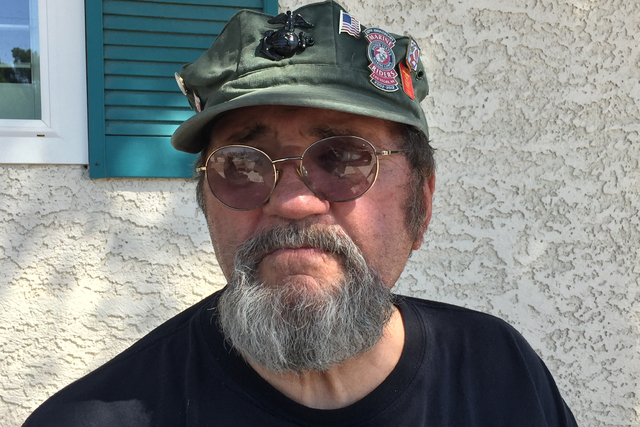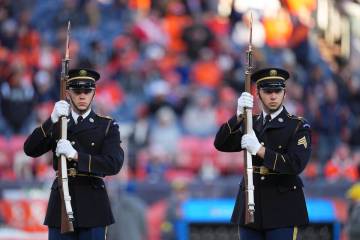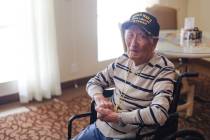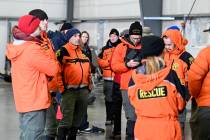VA proposed rule could open floodgates for Camp Lejeune claims
The Department of Veterans affairs has proposed a rule that could trigger a flood of disability compensation claims from veterans suffering from health problems that they say are linked to the contaminated water supply at Marine Corps Base Camp Lejeune.
If it is finalized in its current form, the rule would grant ailing veterans who served at Camp Lejeune over four decades “presumptive status” that their maladies were caused by exposure to toxic chemicals in the water at the North Carolina base. The wording is similar to language in a 1991 law that offered compensation to veterans who were exposed to dioxin-laced Agent Orange defoliants sprayed on the jungle during the Vietnam War.
The proposed rule, published Friday in the Federal Register, effectively modifies a 2012 law that provides VA health coverage for veterans who served at the North Carolina base for at least 30 days between Aug. 1, 1953, and Dec. 31, 1981.
The notice says the comment period is 30 days instead of the usual 60 because time is of the essence for roughly 30 terminally ill vets to file claims.
The proposed rule covers eight diseases related to exposure to volatile organic compounds that were improperly disposed of and infiltrated Camp Lejeune’s water supply — “adult” leukemia, bladder cancer, kidney cancer, liver cancer, multiple myeloma, non-Hodgkin lymphoma, Parkinson’s disease and aplastic anemia.
“If you have one of those conditions then you don’t have to go further with paperwork and documentation to prove that it was caused by the drinking water at Camp Lejeune. It is presumed that it was,” VA spokesman Randy Noller said.
It is not clear how many Camp Lejeune veterans suffer from the covered diseases.
A ninth illness, scleroderma, had been considered, but an expert panel found the “evidence is not sufficient” to establish a positive association between trichloroethylene (TCE) found in the water at Camp Lejeune and development of the chronic connective tissue disease.
Marine veteran Richard Zaccara of Henderson, who served at Camp Lejeune in 1963 and was diagnosed with leukemia in 2003, has been at odds for years with the VA over his compensation claim because the VA relied heavily on a controversial panel of unnamed “subject matter experts” that concluded his illness was not service-related. VA officials acknowledged last week that Zaccara was wrongly billed for hospital visits and chemotherapy pills over the past three years at the VA Southern Nevada Healthcare System.
Critics blame the VA’s subject matter experts for a high denial rate of compensation claims — 80 percent for Camp Lejeune veterans with leukemia.
Zacarra hopes the proposed rule will result in immediate compensation for him and many others when it becomes final.
“It took them a while but at least it got done,” Zacarra, 72, said of the proposed rule. “They should go ahead and give us compensation.”
Noller, the VA spokesman, wouldn’t speculate on how long it could take to finalize the rule.
Retired Marine Master Sgt. Jerry Ensminger has led a crusade for Camp Lejeune veterans and their families through his website, “The Few, The Proud, The Forgotten.”
He said the proposed rule is “quite a distance from where we were 19 years ago.”
“This is a big deal for me,” he said. “I’m cautious. I have to be cautious. This doesn’t mean approval yet but it’s a great leap forward.”
U.S. Sens. Richard Burr and Thom Tillis, both R-N.C., have been pushing the VA to adopt a presumptive status rule because thousands of veterans have had compensation claims denied and, as a result, have lost their ability to work and their ability to support themselves financially.
The senators estimate that from 1953 to 1987, nearly 1 million service members and their families were poisoned by Camp Lejeune’s water supply.
Among those affected is Bill Delaney, 75, a disabled lance corporal from Las Vegas.
He said the VA should acknowledge that many Marines suffered from exposure to Camp Lejeune’s tainted water supply.
“I’ve been harmed,” Delaney said. “Two-thirds of my stomach has been removed because of the water. I had a colonoscopy and the doctors said that I’d have full-blown cancer in 10 years as a result of the water that I drank at Camp Lejeune. I’ve had to live for 30 some years with wearing a bag on my stomach.”
His son, William Cutting, also a Camp Lejeune lance corporal, died July 27. He suffered from colon cancer and endured five organ transplants before his death at age 52.
Delaney said he filed a compensation claim “but they’ve denied me. Denied. Denied. Denied. They gave me a disability for other things but not for the water that I drank and tore my stomach out.”
“We had a child that was stillborn. And it’s probably one of the biggest cemeteries around: the baby cemetery at Camp Lejeune, North Carolina,” he said.
Contact Keith Rogers at krogers@reviewjournal.com or 702-383-0308. Find him on Twitter: @KeithRogers2.
How to comment
Written comments can be submitted on line at www.Regulations.gov; by fax to (202) 273-9026; or mailed to:
Director
Regulation Policy and Management (00REG)
Department of Veterans Affairs
810 Vermont Avenue NW
Room 1068
Washington, DC 20420
Indicate they are in response to "RIN 2900-AP66 — Diseases Associated with Exposure to Contaminants in the Water Supply at Camp Lejeune."






















